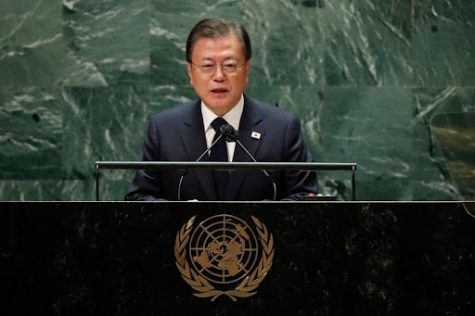Will Harsh Situations in the Korean Peninsula Ever End?
October 15, 2021
As a citizen of the Republic of Korea, I believe that the problems that the Korean people are enduring must be addressed. Since 1945, when the Korean War began, the majority of people in the Korean Peninsula had to separate from each other. Sometimes they had to fight against their own siblings because of the political ideologies from the South and North Korean government. To give a brief explanation, the South was the democratic and capitalist side that was supported by the United States and United Nations, while the North was the socialist and communist side that was supported by China and the Soviet Union-Russia in modern days.
Unfortunately, there were various reasons why the Korean Peninsula was facing some challenges over the decade. First, Korea was divided after we declared independence from Japan, who colonized the whole Korea for a few decades. South Korean founding president, Dr. Rhee Syngman fought against the Japanese government in the United States while he was studying for a doctorate degree in political science at Princeton University; however, Kim Il Sung, the founder of North Korea and grandfather of the Kim Jong Un, combated against the Japanese military in China with the support from China and Soviet Union. After independence, there were some ideological conflicts between the two sides which led North Korea to invade South Korea.

The Korean Armistice Agreement, an agreement that states that the war was on a break, was signed by several nations: United States, North Korea, China, United Nations, and Russia. After the break of war started, South Korea was assiduous and heavily developed their country since 1960. Their development was a miracle for South Korea because not a lot of countries can rebuild their nations from a war. Since then, the Worker’s Party of Korea, the North Korean ruling party, has been a menace to South Korea for a few decades. They have been breaking regulations and treaties from the world in the Demilitarized Zone. Unfortunately, as a result of North Korea’s actions, even though people hope for unification, it will not work; however, one of the positive things about this issue is that the South Korean government is negotiating with different countries to ensure this is a global issue and must be met with attention and resolved with diplomacy, rather than United Nations. This process is known as the Korean Peace Process because South Korea has been backed by various nations.
During the UN assembly, President Moon Jae In, the president of the Republic of Korea, addressed this issue in a speech and said that we, as a world community, must continue the Korean peace process and try to end the Korean War. It is a righteous thing for President Moon to mention this issue; in order to resolve this issue, the United States should persuade North Korea to control nuclear weapons usage rather than implementing economical and militaristic sanctions on them because the latter would aggravate North Korea more. Finally, the North Korean Government should sacrifice their desire for the prosperity of the Korean peninsula because their selfishness is not beneficial to the global community. It deteriorates the situation.
Source:
https://news.un.org/en/story/2021/09/1100602
https://www.wsj.com/articles/north-korea-calls-peace-deal-proposal-by-souths-moon-jae-in-premature-11632473582
https://www.history.com/topics/korea/north-korea-history
https://www.usfk.mil/Portals/105/Documents/SOFA/G_Armistice_Agreement.pdf
https://digitalarchive.wilsoncenter.org/resource/modern-korean-history-portal/syngman-rhee
https://asiasociety.org/education/korean-history-and-political-geography
https://www.bbc.com/news/world-asia-pacific-15278612https://www.korea.net/NewsFocus/Column/view?articleId=202521#font
